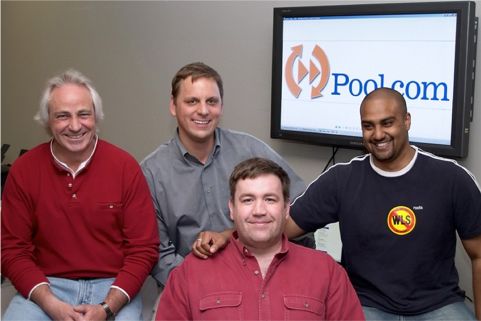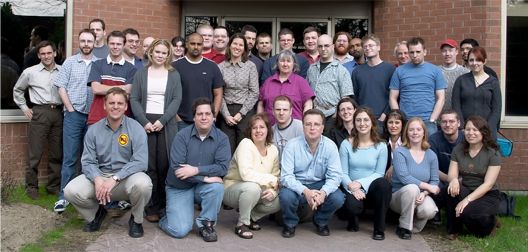

![]()

|
|
| The Pool.com Story: How A Tadpole Turned Into A Killer Whale in Just 12 Months! | ||||||||||
By Ron
Jackson
We know our headline looks like something out of the National Enquirer but this time it's for real! Just last June a small startup company called Pool.com opened their doors in Ottawa, Canada. No one paid much attention to this new toddler 12 months ago, but today the industry�s answer to Andre the Giant towers over everyone else in the drop catching business.
For Pool�s competitors it has been a horror movie that won't end. It probably reminds them of The Little Shop of Horrors, the cult film featuring a potted plant that grew into a man-eating monster overnight. The big difference is the movie had plenty of comedy mixed in. There hasn't been much to smile about for the companies being drowned in Pool�s wake. |
|
|||||||||
|
Of
course that�s the way it is in the business world. It�s survival of
the fittest and in this Battle Royale Pool has managed to
throw everyone else over the top rope. We decided it was high time
to find out how this happened. The last time this kind of upset
occurred in real life David was the guy behind the slingshot.
This time around, a lot of people had a hand in slaying Goliath, so let us introduce you to them and tell you how they got it
done. Pool is actually a subsidiary of a Canadian company called Momentous.ca Corp. that is involved in a variety of Internet businesses. They own the well-known registrar NameScout.com, Internic.ca, Zip.ca and several others that are detailed at the Momentous.com website. Momentous founder and CEO Robert Hall also serves as Pool�s chairman. In 1998, Hall founded the Canadian Internet Registration Authority (CIRA), the registry for Canada's .ca country code domain.
Prior to founding Momentous, Hall was CEO and founder of Echelon Internet Corp. and Internet Access Inc., an Ottawa based ISP that quickly grew to be one of the largest in the region, capturing over 30% of the Ottawa market. Internet Access later merged with Hookup Communications and went public. Hall then hatched Momentous and the companies under that umbrella now serve over 250,000 corporate and individual customers and generate over $30 million (US) a year in revenue.
Hall
handpicked a Pool management team headed by President and CEO Michael
Arrington. Arrington is a Stanford law school graduate
(and current member of the California bar) who crossed the border
after serving as the Chief Operating Officer for Los Angeles based RazorGator
Inc., a multimillion dollar ecommerce ticketing company.
Arrington also worked as an executive, consultant and practicing
attorney at several other high-growth companies. At one of those; Wilson,
Sonsini, Goodrich & Rosati (in Palo Alto, California),
Arrington specialized in mergers & acquisitions and corporate
finance law. While there he co-authored a book on corporate finance
titled The
Initial Public Offering: A Practical Guide for Executives.
Though
he enjoyed a great deal of success in the Golden State, Arrington
had no reservations about packing his bags for Canada. In fact He
thought Pool�s Ottawa location was a major plus. �Ottawa boasts
a number of large public technology companies (Nortel and
others) so quality engineering resources are abundant,� Arrington
said. �The costs of doing business are also much lower than almost
anywhere in the US.� That hasn�t stopped Pool and parent company
Momentous from branching out though. They now have offices in Los
Angeles and London, as well as sales offices in San
Francisco and Salt Lake City.
The
Pool crew also includes former SnapNames.com Chief Technical
Officer Len Bayles who has played a key role in helping Pool
overtake his former employer in the expiring name game. Arrington
said there are other reasons why Pool has supplanted SnapNames as
the most successful drop catcher. �SnapNames has been hurt because
of their business model which requires customers to pay up front and
their unwillingness to pay registrar partners fairly,� Arrington
said. He believes that requiring people to pay even if the
name they want isn�t caught caused many SnapNames customers to
leave when new competitors (like Pool) rolled out systems that do
not require payment until a name has been obtained. When
drop catching attempts fail at SnapNames, customers gets a credit to
use on a different name. The other key difference is that SnapNames
charges a flat fee (currently $69) and only allows one person to
place an order for each name. At Pool an unlimited number of people
can order a name and if it is caught the domain is then auctioned
off to the highest bidder (unless only one person has ordered in
which case that customer gets the domain for $60).
Arrington
added, �From the beginning, Pool.com has focused on three key
business principles - charge a customer only on successfully
obtaining a domain for them, pay our registrars fairly and fight WLS
on behalf of consumers. We were the first backorder competitor to
pay registrars 50% of our revenue. As Snapnames was only paying a
few dollars per domain registered, you can imagine that it wasn�t
difficult for us to take registrars away from them. Many of our
registrars today were formerly with Snapnames and are now making as much
as 10 times what Snapnames paid them.� Pool
chairman Robert Hall is the guy who came up with the idea of allowing
multiple customers to backorder a single domain and holding a short
auction to determine the winner. The formula proved to be an
immediate hit with customers. Arrington said �with any scarce
resource there is a problem of asset allocation. We believe that
auctions are the most efficient way of allocating scarce domain
assets. We spent over 6 months building our auction engine so that
we could roll out a scalable, robust product from day one. To date,
we have closed auctions for over $15 million and close
hundreds of auctions every day.�
Though
Arrington knew Pool had people who could get the job done, even he
admits he could not have predicted such meteoric growth when the
company started out a year ago. �Yes, this first year has exceeded
our own expectations. We never thought we would achieve so much
success so fast!� Right
now, WLS looks like the only threat with enough potential power to
knock Pool out of the saddle. If the plan gets approval from the U.S.
Department of Commerce (and survives multiple legal challenges),
Verisign (the registry for .com and .net domains)
would have complete control of expiring .com and .net domains. In
that system only one person could place an order on a name prior to
expiration (with Verisign getting all of the revenue that now goes to
a variety of competing companies that offer drop catching services). As
an attorney himself, Arrington thinks the courts will have the final
say on whether or not WLS goes forward. �WLS would seriously harm
our business and the businesses of our competitors. We think WLS is
a bad idea, both from our perspective and from the consumers.
We have initiated litigation against ICANN in Canada to fight
WLS and others (8 registrars) have sued ICANN, Verisign, Network
Solutions and Enom to stop the deployment of WLS,"
Arriington said. For those who think WLS is inevitable, Arrington
says think again. �We and others continue to spend resources
fighting WLS directly in Washington D.C. as well as at ICANN.
We think that we are winning the fight and that WLS will not be
implemented.� Of course WLS has supporters as well as opponents in the domain business. Those in favor say it would be a more fair way to distribute valuable expiring domains. Arrington has an answer for that. �Fair� is subjective he says, "but allowing the first in line to get an expiring domain is in no way a better comparative selection method than other methods, such as an auction among all interested parties. An auction clearly distributes assets to those who value them the most. Whereas WLS would distribute those assets to the first in line while others, who may want/need that domain more, would lose."
Arrington
added �WLS forces customers to pay an up-front fee with no
guarantee that the domain will delete. While this is certainly good
for Verisign and their partner, SnapNames, we do not believe it is
good for the consumer. In fact, a registrar lawsuit has alleged that
it is a deceptive trade practice. Competition has driven the
SnapNames model from being the dominant choice to being a minor
niche player. Why kill innovation and bring back this outdated
business model?� Of
course no well managed business would bet its future on the vagaries
of the legal system. So, in the event that WLS does clear the legal
hurdles and becomes a reality, Pool will be prepared. A major step
in that direction was the recent introduction of a new Domain
Marketplace that allows Pool customers to place their own
domains up for sale on the popular venue. �It is already doing
extremely well and would be unaffected by WLS,� Arrington said. �We
would clearly have to make adjustments to our backorder business
under WLS but we have contingency plans if that proves necessary.�
Pool could still continue to catch and auction off .org and the new
extensions (.info, .biz and .us) that are
drawing higher bid prices as they gain recognition, but there is no
understating the damage the loss of .com business would cause. Though Marketplace already has several thousand listings we are seeing some customers expressing reservations about a requirement that any domains they list first be transferred to Pool�s registrar, Namescout.com. Arrington explained the reasoning behind that rule. �We decided to require transfers to Namescout to reduce both buyer and seller fraud. Seller fraud is reduced because we are in control of the domain and can force a transfer to the buyer. Buyer fraud is reduced because we put a special 90 day lock on the domain and it cannot leave the registrar during that period (although the registrant can be changed). That way we can obtain control over the domain in the event of a chargeback (and most chargebacks occur within 60 days). Even
so, if
you do a lot of business with Pool you might be excused from that
rule. �For our well known customers selling lots of domains, we do
not require a transfer to NameScout, but we do require that the
registrar they use implement the 90 day lock feature mentioned
above,� Arrington said. Back
on the drop catching side of the business, the primary complaint
Pool and competitors like Namewinner.com have to deal with
involves problems with certain registrar partners. In the rush to sign
up registrars to help with the domain chase, some are being used
that have little or no customer support or usable interfaces for
domain management. Are they aware of the discontent? �Yes,
we are," Arrington said. "We have a whole team dedicated to dealing with these issues.
With so many registrars obtaining domains, it is becoming more and
more difficult for professionals to manage their portfolios without
massive manual labor. One way we deal with this is to promote the
use of the Namescout front end for domains acquired by Pool,
regardless of which registrar obtains the domain. We have 8
registrars using the Namescout front end today, which simplifies
things somewhat for the customer. We intend to expand this offering
over time as well.� Buyers are currently willing to put up with occasional domain management hassles because their top priority is landing domains in a market where values seem to increase in value on a daily basis. Arrington thinks the industry's rebound still has room to run and cites several reasons why. �Pay per click revenue from Google, Overture and others is clearly driving the market, as is a general rise in internet ecommerce activity,� Arrington said. �More new businesses mean more new domains. Since most good domains in the primary market are taken, people have to look to the secondary markets for their domain.� Pool intends to be the company they look to first and based on what they�ve done in year one it doesn�t look like it would be wise to bet against them!
Editor�s
Note: For those who would like to comment on this story,
we invite you to make use of our Letters to the Editor
feature (write to [email protected]). If you missed our previous Cover Story click on the headline below: Filling
Niches: The Alternate Road to Riches (My Sophomore Year in the
Domain Business) |
||||||||||
|
|
Copyright 2003
Domain Name Journal
A Division of
Internet Edge, Inc.






